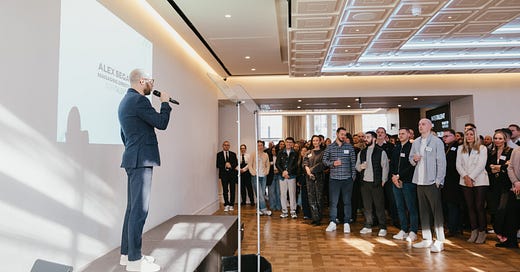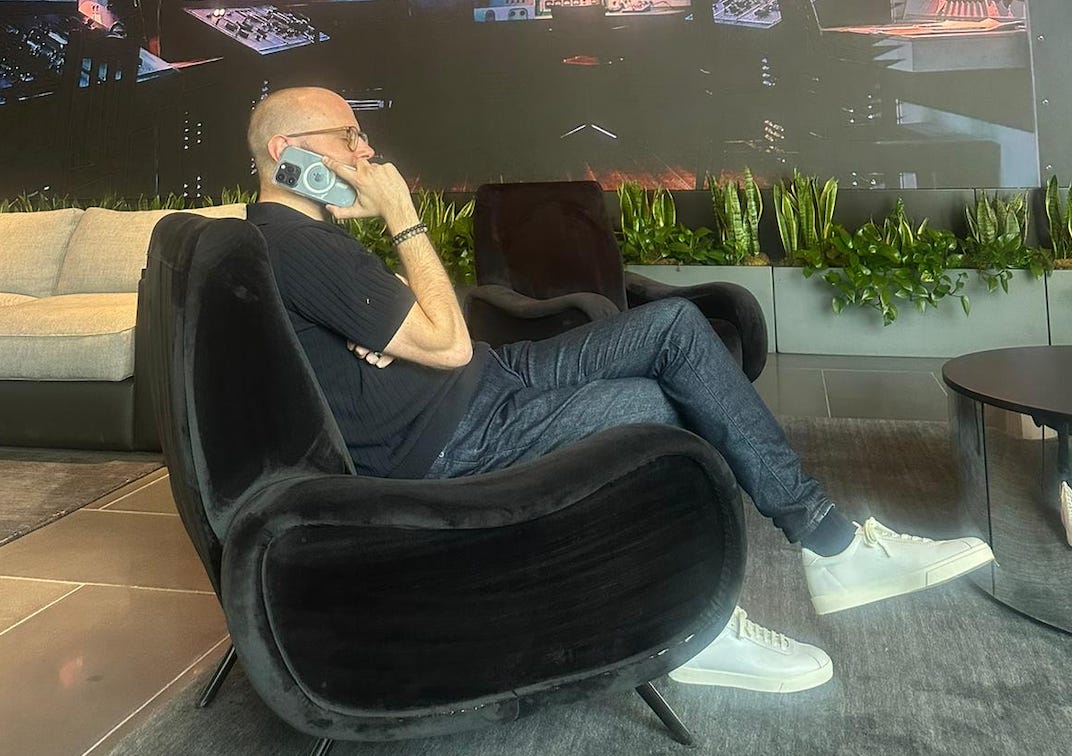I answer your Agent questions... PART ONE!
Alex is the Managing Director of major UK talent agency InterTalent. He represents his clients alongside overseeing the agency's creative strategy, day-to-day operations & acquisitions.
Hi! Please share this post with anyone interested in the inner workings of a Talent Agent. If you are not already a subscriber, please sign up and join everyone who receives Dealmakers straight to their inbox. It’s free, which is not a word that an Agent uses often.
All of my previous blogs about Talent Agents, can be found here.
If you want to hear more of my thoughts, then I have been on 2 podcasts recently. Please check out the TV Makers and Previously Learnt podcasts. Two very different conversations.
🤔 I answer your Agent questions… PART ONE!
We are fully into awards season. I’ll never get bored of putting on a tux and spending an evening celebrating creativity and incredible success stories.
🏆 Broadcast Awards
🏆 TV Choice Awards
🏆 EE Film BAFTA Awards
🏆 BRIT Awards
It’s a privilege to attend them, and I never take it for granted, whether we have clients nominated or not. It’s a great night out, but it's still work. I'm there on business, not a jolly. I love networking. It’s one of the best parts of being an Agent. It’s great to see familiar faces and make lots of new friends too. Every event is a free shot at growing your contact base considerably.
I make a bet with myself and won't leave until I’ve given out a certain number of business cards. It forces me to be brave, say hello to people I don't know, and make introductions. You never know where a conversation might lead. There's nothing better than winning a bet with yourself!
Within awards season, InterTalent celebrated its 15th breakfast networking event. Once again, we returned to the iconic BAFTA building in Piccadilly, and 300 industry leaders from across the entertainment and creative sectors met with our exceptional roster of talent. Our company now covers Scripted, Unscripted, Digital, Gaming, Comedy, Brand Partnerships, Music, Sports, Content Creation, Live Events, and Business Ventures.
I took to the stage halfway through to outline InterTalent’s continued commitment to innovation and always looking to be first to new ideas, whether they succeed or not. I’d rather step up, go for it, and see what happens, not wait for everyone else to do it and only move forward when it’s safe to do so.
I appreciate everyone who reads Dealmakers. I get a lot of feedback and questions about whatever topic I write about, so I thought I’d change things up and answer some of your questions. There were a few, so I’m splitting this into two parts.
Let’s go! ⬇️
Q1: How do you ensure that you stay ahead of the curve with your clients?
Great question, especially in the face of a rapidly changing landscape and difficulties in traditional options. Here are my 4 key things to consider:
KNOWLEDGE: Know as much as you can about your industry. Everything from the history of it to the mechanics of how things currently work. The more you genuinely understand your world, the easier it is to predict the future. Reading and listening to as much as you can will give you so much information, which means you can plan accordingly. Most agents don’t know anything near enough about the entertainment industry. It doesn’t take a lot but will put you ahead of the pack.
DIVERSIFYING OUTPUT: In 2025, there are so many ways to find an audience that limiting a client to just one lane is extremely precarious. If that lane takes a bump, they have nothing else. Staying ahead of the curve is often about being nimble, having multiple ways to broadcast what they do, and trying new things even if there’s no rulebook yet on how to make them work. This mirrors my own strategy for running InterTalent.
COMFORT ZONE: Pushing your client out of their comfort zone is so important to this. They’ve hired you for a reason and if you see a great opportunity that can keep your client relevant you need to explain to your client why it’s a great move. This comes back to having great industry knowledge. No one likes stepping out of their comfort zone and potentially failing, but those who get into a new concept relatively early are the ones who usually win. Bravery in an agent will make it more possible to have bravery in a client.
SURPRISE PEOPLE: This was a big lesson I learned very early on in my assistant days when I worked for one of the biggest scripted agents in the world for nearly 4 years. If you always do what people expect you to do, it’ll get boring very quickly and your relevance will dwindle. Doing something unexpected, going left when people think you’ll go right and taking on a project that is authentic but isn’t what anyone would guess is a great way to ensure longevity and continue to freshen things up. Don’t do what people expect you to do. There is nothing ‘ahead of the curve’ about that.
For more thoughts on this topic, check out my blog on the art of ‘STRATEGY & SURPRISE’ and ‘ADAPT & ADOPT’.
Q2: If you could re-write the rule book and have the industry follow your lead, what’s the one big industry do that you would make a don’t or vice versa?
There is so much I would change but here’s one…
I would love to see a degree or an education in some capacity for those who want to be agents or managers. It’s such a great career but it’s a complex one which takes creativity, business acumen, strategy, nuance, performance and more. I know you can take courses in business management or creative arts but it’s not the same. You can manage someone’s career without needing any qualifications or training and I’m not sure if that’s always a great thing for our industry. I wrote a blog about what makes a great agent here.
Q3: How early in the process is it best to approach talent? We have a very big and ambitious idea to revolutionise schools in the UK and ideally would want 1 or 2 well-known entrepreneurs involved from this very, very early stage.
It’s never too early to approach an agent for their client. The earlier you approach, the more time you have to ask questions, consider the proposal, and be a creative partner on the journey. Quite often, talent is the last thing considered, and you get approached very late in the day, which creates a mess and not enough time to be important to the process.
It’s much easier if you already know the agent or talent, so there is trust in the project. If it's someone I've not worked with before or doesn't have a known reputation, I would look at how they've approached. How do they write? Receiving 300 emails a day, you quickly get a sense of what’s serious and what isn’t.
Then I'd have a chat with them on the phone. Tell me more. Is it funded? What's your plan? Why my client? Who is involved? What’s important to you? Everything. If I feel like it's real and could be of interest to my client, I’ll always take it to them. Even if I'm not sure they should do it. If the client is interested. Then we'll do a meeting either with the client or without, depending on how confident I am about this person and go from there.
I was interviewed for theatre producer Tim Johanson’s book and spoke about the producer/agent relationship. There is a lot of crossover with this question so well worth reading my interview here.
Q4: How do you maximise opportunities when the industry can be very up and down and unpredictable? How do you ensure clients have at least some line of work when the phone sometimes stops ringing and can be a while before it does again?
Another very pressing question given the industry we now find ourselves in. In addition to my answers in Q1, here are more things to consider…
ROBUST TEAM: Being at a talent agency that has a robust, experienced team is invaluable. There is nothing wrong with being a one-person band or having a very boutique company but the one challenge you have when faced with a phone that stops ringing is that you only know who you know, and only know what you know. Since 2020, I have taken our InterTalent team from a company of 20 people to now nearly 50 and the biggest change I have seen is that more conversations are happening, more ideas are being created, more relationships with the company and therefore more opportunities come. Being surrounded by lots of talented people who can help solve a client's conundrum is invaluable. Even if you’re at a small company, please use your network to help you through a sticky situation.
MULTIPLE IDEAS: You must have new ideas for each client at all times, and more than one. If you don’t have any then that’s a concern. Each client should have a strategy across 1, 3 and 5 years and at all times there should be new ideas to explore. Waiting for the phone to ring doesn’t matter if you’re the one making the call.
MANAGE EXPECTATIONS: The truth is, everyone will have great moments and slow moments. Ask anyone super successful and they will tell you about the long periods they were out of work. It happens. If you have a client who can’t handle the difficult moments then you have to consider if they’re cut out for the long term. It’s harsh, it’s unforgiving and it’s not fun at times. You need to manage your client’s expectations and keep them positive & ready for when that next opportunity comes.
Q5: With the proposed UK copyright law changes, how are you planning to protect your clients' work from being used by AI without permission or payment? Any steps to ensure your talent’s ideas, style, and content remain safeguarded and fairly compensated in an increasingly AI-driven landscape?
This is a big conversation that I have multiple times a week. We are, of course, keeping up with all discussions on how to protect our client’s work from being repurposed by AI. Right now, there is no definitive answer on the best way to do that… but I hope one comes ASAP. What you need to do is keep knowledgeable on the topic, and understand the complexities of AI but also appreciate the huge value it brings. This is nothing new. We’ve gone from VHS to DVD to BluRay to Downloads etc. We’ve had YouTube. We’ve had streamers. This may well be the biggest change yet but it’s just another change.
We have to be open to and embrace new technology, but we must also use it ethically and ensure that our clients have the best advice when they ask how it will impact them. I will write a whole blog post on AI later this year, but I don’t want to do it until I have answers to the kinds of questions you are asking. Protecting our clients financially and creatively is the most important thing an agent can do.
My thoughts on what’s to come in 2024 include AI… check it out here.
PART 2 TO COME…
📥 I would love to hear from you. Any ideas, thoughts and feedback via alex@intertalentgroup.com are always most welcome.
Please subscribe if you don’t already and tell your friends.
See you next time.
Alex





